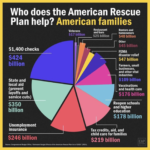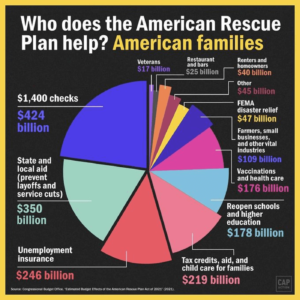Does Biden’s American Rescue Plan Open a New Era of Reform?

 This article was written for L’Anticapitaliste, the weekly newspaper of the New Anticapitalist Party (NPA) of France.
This article was written for L’Anticapitaliste, the weekly newspaper of the New Anticapitalist Party (NPA) of France.
The U.S. Congress has passed and President Joseph Biden has signed his $1.9 trillion American Rescue Plan (ARP) to address the twin issues of the coronavirus pandemic and the economic crisis. Not only is this the largest such relief measure in the country’s history, but some of the bill’s programs should lift millions out of poverty. While the bill passed both houses of Congress, all Republicans voted against it, even though 70 percent of Americans support it, including 45 percent of Republicans. Today across the political spectrum people are asking: Is this the end of neoliberal austerity? Is this the beginning of a new era of American reform? Does this represent the start of a genuine social democratic welfare state for America?
The ARP provides billions to deal with the pandemic, relief for the unemployed and workers, aid to state and local governments, and support for various industries from restaurants to airlines. There are funds for childcare, education, an expansion of affordable health care, including mental health, an expansion of food programs, housing assistance and help for the homeless, as well as aid to public transportation. While the primary function of the bill is to relieve the crisis of the last year, many believe that it will lead to permanent programs that represent the country’s third great American social reform in the last 100 years.
The United States’ first modern era of social reform came in the 1930s when President Roosevelt achieved his New Deal legislation. In the depth of the Great Depression, as unemployment reached 25%, Roosevelt created jobs programs that employed millions. More important, FDR passed the National Labor Relations Act (NLRA) that for the first time gave workers the right to organize unions and the Social Security Act that created government pensions. These two reforms represented America’s social welfare state, a less comprehensive version than Europe would later create. FDR’s New Deal set the standard for meaningful, structural reform in America.
Thirty years later, in the 1960s, Lyndon B. Johnson’s Democratic administration created the Great Society reforms. Johnson’s pushed Congress to pass the Civil Rights and Voting Rights Acts, which together ended Jim Crow disfranchisement and segregation in the South. He also won Medicare, national health insurance for people over 65; Medicaid, health care assistance for those with low incomes; and the food stamp program offering nutrition assistance. Johnsons’ “War on Poverty” also created the Office of Economic Opportunity, which managed jobs programs, early childhood education, and community assistance programs. Republican Ronald Reagan dismantled the Great Society programs in the 1980s and under Democrat Bill Clinton neoliberalism and austerity followed.
Democrats claim that Biden’s ARP continues the work of Roosevelt and Johnson and that it will transform America. Yet, while these reforms are much needed, none of the programs begins to transform the fundamental structures of American capitalism, a system that generates an economy and a society among the most unequal in the world. The ARP programs fall far short of any social democratic welfare state. We still have no national healthcare system, relatively little public housing, and a public education system that fails millions. Biden’s ARP does, however, suggest that in the face of the multiple crises of our society, neoliberal austerity is being attenuated.
With the ARP, Biden may have unified many Democratic and Republican working people in support of government aid, but passively in the absence of a workers’ movement. Most important there are no controls on capital, no regulation, no socialization. Biden’s reforms are a far cry from the democratic socialist society that we need to address our social problems, one that can only be built by a working-class movement that undertakes to socialize finance and industry.